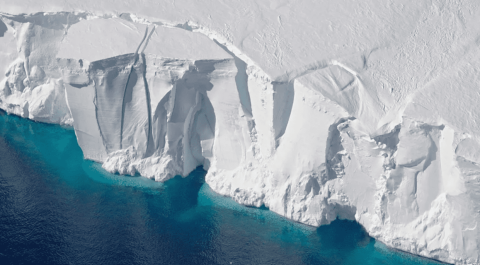A collapse of the AMOC in this century is unlikely, says modelling study
The Atlantic Ocean's main current system - the AMOC - could weaken without collapsing this century, according to modeling published in Nature. This finding contradicts earlier studies that predicted the collapse of the AMOC around 2050. The research uses models that include extreme changes in greenhouse gas concentrations and freshwater levels in the North Atlantic. This system of ocean currents is involved in regulating global temperatures.

Even under extreme climate change, the Southern Ocean sustains a weakened but resilient Atlantic overturning circulation (AMOC), a vital component of Earth's climate system. Credit: Jonathan Baker (Met Office) and co-authors.
250227 Ma Dolores AMOC EN
María Dolores Pérez Hernández
Researcher in the Unit Ocean and Climate of the Oceanography and Global Change Institute (IOCAG) at Universidad de Las Palmas de Gran Canaria (ULPGC-CSIC)
In this article [the authors] use a wide set of CMIP6 models to predict the future behavior of the AMOC. The CMIP6 models are a very useful tool to understand processes and predict future scenarios. However, they need to undergo a sensitivity analysis using observations to understand the limitations of the results. Here the sensitivity analysis is not shown, and the reader needs to accept the model outputs without having a sound feeling of their reliability.
To infer the future behavior of the overturning circulation, they use a novel methodology in which they do not only take into the account the vertical transformation (downwelling) taking place in the North Atlantic but also the upwellings taking place at the Southern Ocean, Indian and Pacific Ocean. Consistent with previous results done with CMIP models, they observe a decline of the AMOC in the first 25 years. However, these models do not [predict] a collapse after that, but a steady low state of the AMOC sustained along nearly 100 years. Observations so far do not show an AMOC collapse but they provide signs that suggest that, at least, a weakening of the AMOC is soon to happen. In particular, we observe a warming ocean and atmosphere that contributes to ice, sea-ice and glacier melting, bringing more freshwater into the system and increasing the buoyancy of the upper layers (more buoyancy impedes the vertical transformation from surface to deep layers that occurs when the water mass cools in the North Atlantic and becomes denser).
In this paper, it is stated that the vertical transformation of the AMOC will keep on taking place as it needs to compensate the upwelling taking place in the Southern Ocean, and the Pacific MOC (PMOC) is not providing enough compensation. Though it is true that the ocean follows the mass balance constraint, the driving mechanisms of the AMOC, PMOC and Southern Ocean upwelling differ and a weaking or collapse of any of the three will impact the others at different timing. If we stop the vertical transformation in the Atlantic, it will reduce the Southern Ocean Upwelling, PMOC and Indian Ocean MOC but with a lag. I missed a detailed explanation on how these vertical processes relate in time.
Overall is an interesting idea that needs to be further explored with more realistic models that overlap with observations to fully understand the impact of the compensation mechanism described here.
Jonathan Bamber - AMOC
Jonathan Bamber
Director of the Bristol Glaciology Centre, University of Bristol
This paper presents a careful and thorough analysis of how the AMOC responds to both extreme greenhouse gas and freshwater forcing that could result from accelerated fossil fuel consumption and increased melting of the Greenland Ice Sheet. Their analysis is based on examining 34 state of the art climate models and strongly suggests that the AMOC is not close to a tipping point for present-day and near-future climate. That is good news. While they find no evidence for a switch off or collapse of the AMOC they do find a weakening in all cases and this, alone, should be cause for concern. Because the AMOC is responsible for so much of the oceanic poleward heat transport, changes in its strength have a huge impact on the climate of northwest Europe and globally.
A collapse of the AMOC would be devasting for civilisation so it is understandable that there has been a lot of focus on whether this might happen in the near future but a weakening of the AMOC should also be of concern. While it might not grab the headlines in the same way and its impact is a little more complicated to explain, it is still extremely important to model, understand, monitor and predict.
Conflict of interest: "I am a member of the Advisory Committee for Earth Observation of the European Space Agency and a member of the European Space Science Committee, which receives funding from a number of national space agencies. I also receive funding from the European Commission."
Lee de Mora - AMOC EN
Lee de Mora
Marine Ecosystem Modeller, Plymouth Marine Laboratory
The Atlantic Meridional Overturning Circulation is hugely important to the global climate, influencing heat transport, carbon drawdown and deep water formation. Despite its importance, the future of the AMOC is not yet fully understood.
On one hand, the climate models from Coupled Model Intercomparison Project Phase 6 (CMIP6) universally projected a weakening in the AMOC as temperatures increase, but they did not project a full collapse to zero at any warming level. On the other hand, some experiments have suggested that the AMOC is too stable in those CMIP-style models, and the real AMOC may be more prone to collapse.
This paper from Baker et al. identifies AMOC-stabilizing mechanisms in the Southern Ocean and Pacific Ocean that may explain why the CMIP6 models have a stable AMOC.
Conflict of interest: "I was supported by the UK Natural Environment Research Council through The UK Earth System Modelling Project (UKESM, grant no. NE/N017951/1) and by the UK Natural Environment Research Council through the TerraFIRMA: Future Impacts, Risks and Mitigation Actions in a changing Earth System project, Grant reference NE/W004895/1.”
Baker et al.
- Research article
- Peer reviewed
- Modelling



